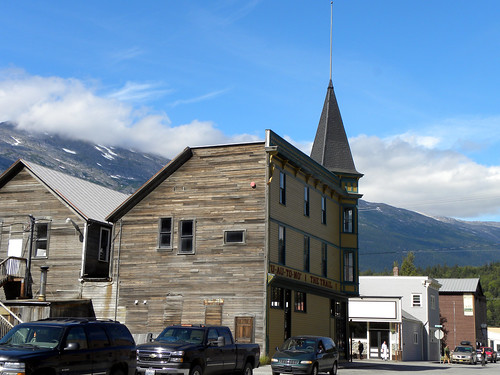Kelly’s brother turned up on our doorstep out of the blue some weeks ago. He was on a business trip to Vancouver, and had ended up at a big fancy dinner at Federico’s Supper Club, which is just around the corner from us. So he ducked out and came to visit.
Part of catching up involved his telling us about a recent trip: he and his family had just come back from a Disney Cruise to the Mediterranean. They came back more tired than they were before they left, he said, because they went on so many shore excursions. (And, really–the Mediterranean? How could you not?) Still. The prospect of spending my downtime getting exhausted did not appeal. I vowed then and there to sit on my butt as much as possible while I was cruising.
So last week, amid the visiting and the wandering around various Alaskan towns, I finished Adam Nicholson’s Quarrel with the King: The Story of an English Family on the High Road to Civil War , reread the oft-mentioned Tana French novel In the Woods
, reread the oft-mentioned Tana French novel In the Woods
and got two thirds of the way through In Triumph’s Wake: Royal Mothers, Tragic Daughters, and the Price They Paid for Glory .
.
The Nicholson book was rough slogging at points. English history isn’t my strong suit, and this covers several generations of Pembroke family history, with regard to their relationship with the Crown. It goes from Henry VIII through to the Revolution. The best part, for me, was Nicholson’s lovely descriptions of the terrain around Salisbury. Here’s a snip:
Early on a summer morning–and you should make it a Sunday, when England stays in bed for hours after the sun has risen, the chalk downland to the west of Wilton slowly reveals itself in the growing light as an open and free-flowing stretch of country, long wide ridges with ripples and hollows within them, separated by river valleys, with an air of Tuscany transported to the north… At first, the larks are up and singing, but everything else is drenched in a golden quiet. Shadows hang in the woods, and the sun casts low bars across the backs of the hills. You will see the deer, ever on the increase in southern England, moving silently and hesitantly in the half-distance. It is a place of slightness and subtley, wide and long-limbed, drawn with a steady pencil.
I think if you already have a background in this era, it’s a delight. Otherwise, consider waiting on it until you know more. I might still try God’s Secretaries: The Making of the King James Bible (P.S.) , but not soon.
, but not soon.
I have been trying to sell Kelly on Tana French, so as soon as she wanted In the Woods, I handed it over. (I finished it yesterday.) My initial reaction to the book is here. I was so ambivalent I gave it away, only to realize after the fact that I’d loved it, so we bought a copy for Kelly to read on the cruise.
In Triumph’s Wake is rocking my world, and will get its own post after I’m finished with it. Meanwhile, here’s a preview of tomorrow’s post about our day in Skagway:




